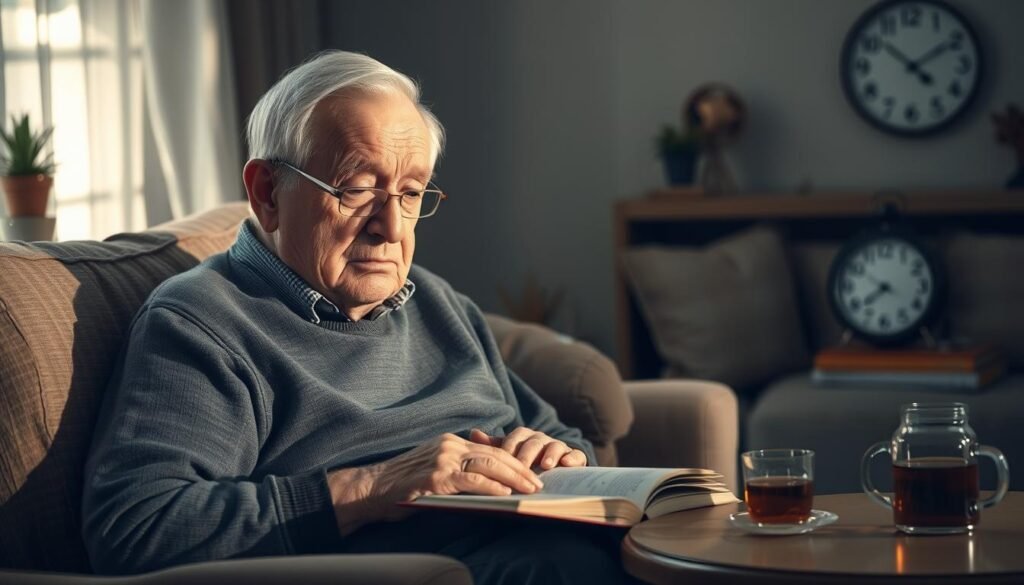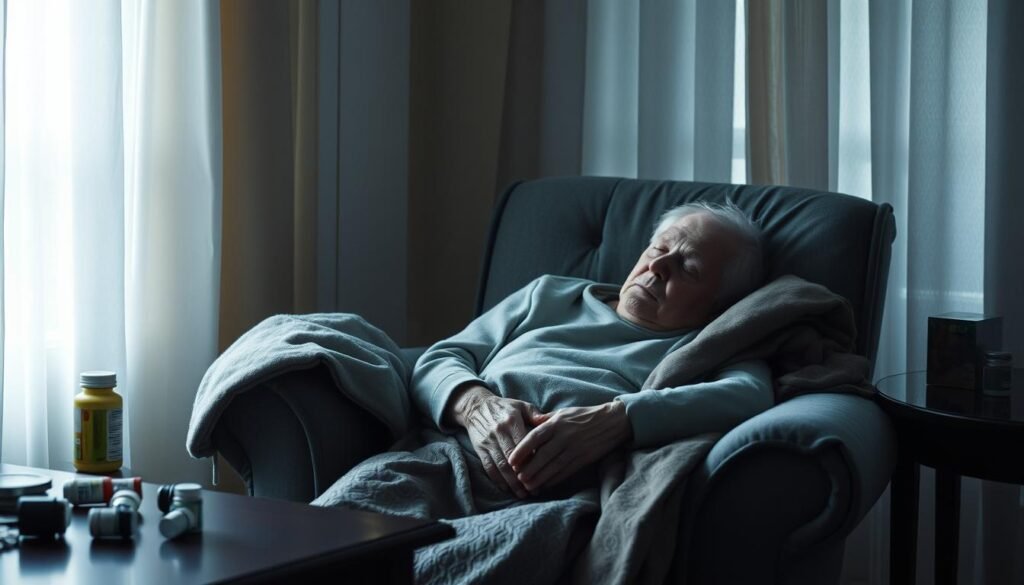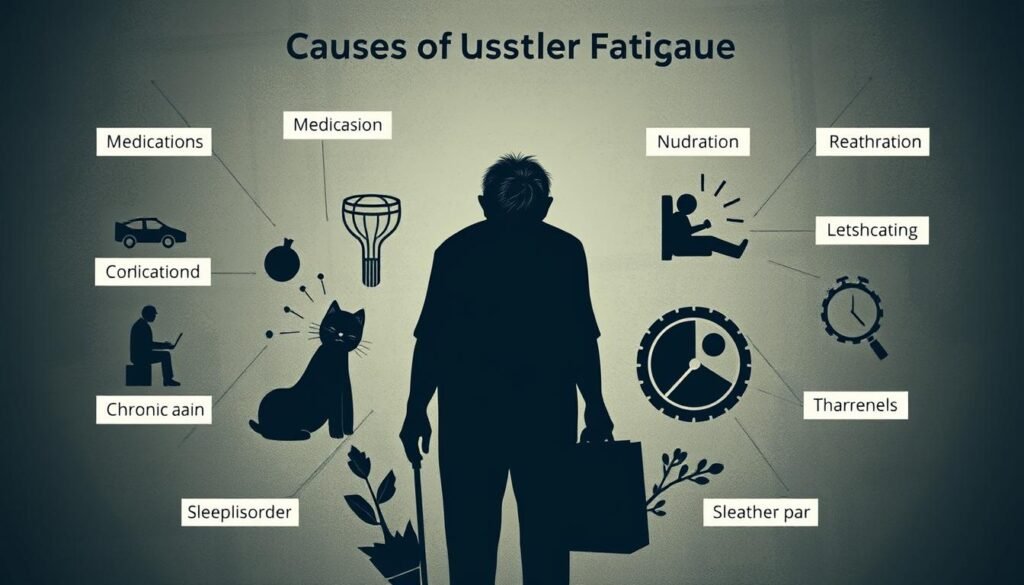Did you know anemia affects about 10% of those 65 and older? This condition is just one reason for sudden extreme fatigue in the elderly. Fatigue is complex, indicating possible health issues that need addressing. Caregivers and healthcare providers must understand the causes of elderly fatigue to help improve older adults’ lives.
Chronic illnesses, medications, and emotional health all impact senior fatigue. For example, medications for older adults might not work as well over time. Also, not eating well or skipping exercise can make fatigue worse. It’s important to look at everything affecting an elderly person’s life.
To help seniors feel more lively, addressing these factors is key. Caregivers can learn more about handling fatigue by looking at resources like overlooked causes of fatigue in older adults.
Key Takeaways
- Understanding fatigue in the elderly means looking at both body and mind health.
- Anemia and not drinking enough fluids often lead to senior fatigue.
- Chronic pain can really lower energy in older people.
- Medicines might not work as well later on, adding to tiredness.
- Seeing a doctor is important to figure out what causes fatigue.
- Changes in lifestyle can make a big difference in well-being.
Understanding Fatigue in Older Adults
Fatigue is a big issue for seniors, more serious than just being tired from daily tasks. As people get older, they face changes that use up their energy. This includes health problems, losing muscle, and not sleeping well.
Health issues like diabetes, arthritis, and breathing problems can really lower energy. This kind of tiredness might be a warning of other health concerns. It’s important for older folks to pay attention to how they feel. Feeling worn out can also come from emotional issues like stress and sadness. It shows how vital support is for them.
Being active and staying connected with others can help fight off tiredness. Keeping an energy diary is a smart way to find out what makes you more tired. Even light exercise like walking can boost energy.
Better sleep habits also reduce fatigue. This means not too much coffee and avoiding long daytime naps. Finding ways to deal with emotional issues is very important too. This could be through talking with friends or getting professional help.
Common Symptoms of Fatigue
Fatigue in older adults shows up in many ways. It’s more than just feeling tired. It includes symptoms that really change daily life. Here are some common signs of fatigue in seniors:
- Excessive sleeping or napping during the day
- Emotional swings and irritability
- Feeling worn out despite adequate sleep
These symptoms often suggest deeper issues, like senior weariness factors. For many seniors, fatigue comes with other health problems such as depression and anxiety. Spotting these signs early helps caregivers make changes. These changes improve elderly folks’ well-being.

If fatigue lasts over two weeks, it’s time to see a doctor. This is even more urgent if there are severe symptoms like rectal bleeding or an irregular heartbeat. Getting ahead of these symptoms can make life better.
Lifestyle changes can also fight fatigue. Staying hydrated, eating well, and being active are key. Paying attention to these things can fight many causes of tiredness in the elderly.
What Causes Sudden Extreme Fatigue in Elderly
It’s important to know why older people suddenly feel very tired. This can help take care of their health better. The main reasons usually involve long-term health problems and their feelings or mental state.
Chronic Medical Conditions
Many long-lasting health issues can make older adults very tired. For example, diabetes, heart disease, and breathing problems like chronic obstructive pulmonary disease reduce energy. Also, treatments such as chemotherapy and surgeries can make them feel more tired. Plus, sleeping problems and untreated pain from conditions like fibromyalgia play a big role in sudden tiredness.
Emotional and Psychological Factors
Feeling emotionally upset can drain elderly people’s energy too. Being anxious, sad, or mourning can lead to tiredness. Worries about money might make it worse. It’s vital for those taking care of them to notice these emotional problems. Dealing with these issues can make a big difference in their lives.

Physical Health Issues Leading to Fatigue
Understanding physical health issues is key to tackling fatigue in the elderly. Anemia and dehydration are significant factors. They drain the energy of older adults. Knowing their symptoms helps manage their effects better, improving life quality.
Anemia and Its Impact
Anemia affects about 10% of seniors over 65. It happens when there aren’t enough healthy red blood cells. This leads to weakness, dizziness, and low energy. Many things cause anemia, like iron deficiency or chronic illnesses. Fixing it can mean dietary changes or iron supplements, boosting energy and vitality.
Dehydration and Its Consequences
Dehydration is another big reason for senior fatigue. Seniors often don’t feel thirsty, especially if they take certain medicines or have health issues. Not drinking enough water can make them tired, moody, and irritable. This adds to their fatigue. Helping them drink more water and checking if they’re hydrated can fight fatigue. Proper hydration boosts energy and well-being.
Lesser-Known Causes of Elderly Fatigue
We find more complex reasons for fatigue in the elderly when we look deeper. Often, the sources of serious fatigue go beyond what we first think. It’s important to talk about conditions like Chronic Fatigue Syndrome and hypercalcemia.
Chronic Fatigue Syndrome
Chronic Fatigue Syndrome (CFS) is a problem for many older people, causing long periods of intense tiredness. This tiredness is not because of exercise or any known health problems. It greatly affects how well they can do everyday activities. So, it’s very important for those who care for them to recognize these signs. Knowing about it can help in finding the right treatments and ways to manage the condition.
Hypercalcemia Disorders
Hypercalcemia disorders mean there’s too much calcium in the blood. These disorders are often linked to problems with the parathyroid gland. They can cause symptoms like feeling very tired, having mood changes, and low energy. Understanding these links is key to spotting and handling fatigue in the elderly.

| Condition | Symptoms | Impact on Energy |
|---|---|---|
| Chronic Fatigue Syndrome | Extreme fatigue, difficulty with concentration | Significant decrease in daily functioning |
| Hypercalcemia | Fatigue, nausea, mood swings | Potentially debilitating, affecting overall well-being |
Medication and Fatigue in Seniors
Medications for health issues can sometimes cause fatigue in seniors. Drugs like antidepressants, antihistamines, and pain relievers are common culprits. They may lead to senior exhaustion reasons because their side effects differ from person to person.
Medications for chronic conditions can also lower energy levels. For example, blood pressure drugs are important but can make seniors feel tired. If fatigue is a constant problem, seniors should talk to their doctors. They can explore other medication options together.
It’s important not to ignore emotional causes of fatigue in seniors. Feelings of depression, anxiety, and grief can add to the tiredness caused by medications. Understanding all the possible causes is key. This helps make treatment plans that improve both mental and physical health.
Finding more information can help seniors live better, even with medication-induced fatigue. Exploring additional resources is a good step.
Lifestyle Factors Contributing to Tiredness
Lifestyle factors have a huge impact on the tiredness felt by seniors. These factors include daily habits and routines. Knowing how they affect energy levels can lead to better fatigue management. Key areas are too much sleep versus sleep disorders and the impact of diet and exercise.
Oversleeping vs. Sleep Disorders
Many think sleeping a lot gives seniors the rest they need. But, oversleeping can actually make you feel groggy and more tired. On the other hand, sleep disorders like sleep apnea disrupt normal sleep. This often results in waking up feeling tired. Good sleep habits are crucial, like going to bed at the same time every night and avoiding screens before bed.
The Role of Diet and Exercise
Eating right and staying active are key to fighting aging fatigue. A diet full of nutrients boosts energy levels. Exercising for 30 minutes, three times a week, increases stamina and reduces tiredness. Cutting down on caffeine, alcohol, and not smoking can greatly improve your health.
| Lifestyle Factor | Effect on Fatigue |
|---|---|
| Poor Sleep Quality | Contributes to daytime tiredness and affects overall energy levels |
| Oversleeping | May lead to grogginess and feeling unrefreshed |
| Poor Diet | Lack of nutrients can lead to energy depletion |
| Regular Exercise | Boosts energy levels and combats aging tiredness triggers |
| Hydration | Maintaining hydration helps maintain energy and focus |
Holistic Approaches to Manage Fatigue
Many elderly people face fatigue, which affects their day-to-day life. To understand this fatigue, it’s important to know the causes, often called elderly burnout catalysts. By adopting holistic methods, we can better manage these symptoms. Mindfulness, therapy, and exercise together can improve seniors’ health and energy.
Mindfulness and Therapy Options
Mindfulness, like meditation and yoga, helps with emotional control and stress. These techniques are especially good for seniors, helping them fight off fatigue and lack of energy. Therapy advancements, such as cognitive behavioral therapy, work well against depression and anxiety. These issues can make fatigue worse in the elderly.
Benefits of Regular Exercise
Exercise benefits both mind and body for seniors. It improves sleep, which is essential in fighting fatigue. Seniors are encouraged to exercise 3–5 times a week to stay energized. Even light activities, such as walking, can reduce tiredness and boost well-being.
Conclusion
It’s very important to understand why sudden extreme fatigue happens in the elderly. It improves their life quality. In the U.S., about 40% to 74% of older people are affected. This shows why it’s essential to know the causes of severe fatigue in them.
Knowing the causes of fatigue helps families and health workers. It could be chronic diseases like anemia or heart problems. It could also be the side effects of medicines or certain lifestyle choices. Understanding these factors helps in dealing with fatigue more effectively.
To help the elderly feel better, focusing on healthy habits is key. This includes good sleep, staying active, and eating well. By doing these things, seniors can enjoy a better and more active life.
By working together, we can help seniors live life to the fullest. Let’s make a commitment to understand and address their fatigue. For more tips on managing fatigue, check out this resource.